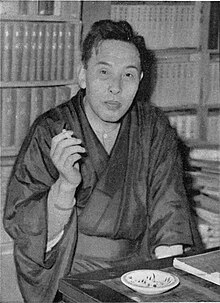Kyūya Fukada
Kyūya Fukada | |
|---|---|
 Fukada Kyūya | |
| Born | 11 March 1903 Kaga, Ishikawa,Japan |
| Died | 21 March 1971(aged 67) MountKayagadake(Mao ヶ nhạc),Yamanashi prefecture,Japan |
| Occupation | Writer |
| Genre | non-fiction |

Kyūya Fukada(Thâm điền lâu di,Fukada Kyūya,11 March 1903 – 21 March 1971)was aJapanesewriter and mountaineer active during theShōwa periodin Japan.
Early life
[edit]Kyūya was born in what is nowKaga city,Ishikawa prefecture.He attended theFujishima High School,followed by the preparatory school for theTokyo Imperial University,where he studied literature. During this time, he became friends withHori TatsuoandTakami Jun.He also joined the school'smountaineeringclub, and took thepen-nameof Kyusan (literally Nine Mountains) as hishaiku pseudonym.
While a student at Tokyo University, he began writing short stories, and he also fell in love with the poetKitabatake Yao.Shortly after they started living together, he published his first work.Orokko no musume.The work was well received by critics, emboldening him enough to quit school in 1930 and to devote his energies to writing.
Literary career
[edit]In 1932, Fukada published his next work,Asunarao.However, leading literary criticsKobayashi HideoandKawabata Yasunarisoon realized thatAsunaraoand his previous workOrokko no musumewere not Fukada's works at all, but had beencopy-edited(or to put it less charitably,plagiarized) from the writings of Kitabatake Yao.
In March 1940, Fukada formally married Kitabatake Yao. However, in May 1941, Fukada happened to be reunited with his first love, Koba Shigeko (the sister ofNakamura Mitsuo) in a chance meeting, and by August 1942, Shigeko gave birth to his illegitimate child. His wife soon found out about the affair, and Fukada quickly enlisted in theImperial Japanese Army,asking for an immediate transfer to the front lineswar-time Chinato avoid the potentially more dangerous conflict at home; he served for the next three years in front-line combat units fromQingdaotoNanjing.
At the end of the war, Fukada was demobilized, and returned to Japan in 1946, but he avoided a reunion with his wife and went back to Shigeko, whom he married as soon as his divorce was finalized. However, Fukada and his new wife were forced to live in poverty over ten years, as his former wife made sure that the earlier issue of his “copy edited” versions of her works was remembered by publishers. Partly due to the stigma he was unable to publish any works for over 10 years.
Fukada was reconciled with fellow mountaineer Kobayashi Hideo, who encouraged him to write non-fiction works about mountains and mountaineering. From 1959 to 1963, he wroteNihon Hyakumeizan(100 Famous Japanese Mountains), which was an immediate hit, and which won the 16thYomiuri Prize.[1]In 1968, Fukada was made vice-chairman of theJapan Mountaineering Association.In 1966, and again in 1969–1970, he made long journeys inCentral AsiaofChinaand theSoviet Union,exploring the mountains of theSilk Road.
Fukada died in March 1971 of astrokenear the summit of MountKayagadake(1704 m) inYamanashi prefecture.His grave is at the temple of Honko-ji in Daishoji-machi, Kaga city, Ishikawa prefecture.
Fukada was honored by theJapanese governmentwith acommemorative postage stampissued on 1 July 2003.
See also
[edit]References
[edit]- ^"Đọc bán văn học thưởng đệ 11 hồi ( 1959 niên độ ) ~ đệ 20 hồi ( 1968 niên độ )"(in Japanese).Yomiuri Shimbun.RetrievedAugust 15,2018.
